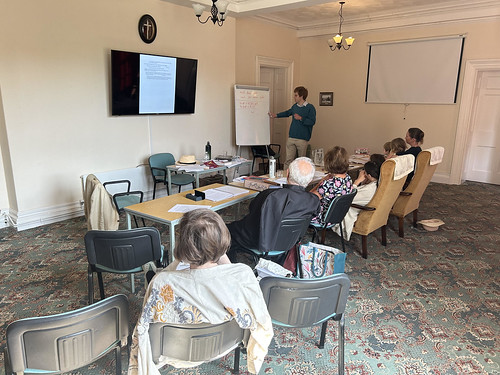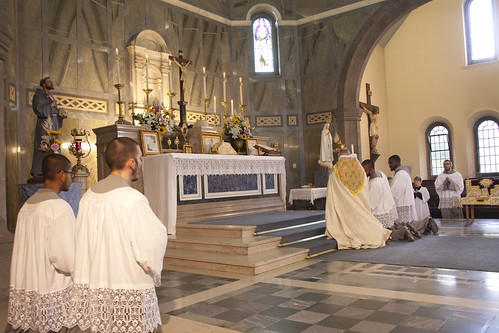Chairman's Blog
LMS Oxford Martyrs Pilgrimage, 19th October
With Dominican chant and sacred polyphony from the Schola Abelis and the Southwell Consort.
William Byrd Mass for Five VoicesThomas Tallis In Manus TuasWilliam Cornysh Ave Maria
LMS Residential Latin Course: photos
This year the week-long course (Monday to Saturday) took place in Park Place Pastoral Centre in Wickham, Hampshire, with 18 students -- equaling our largest ever group in 2019 -- and three tutors, who were able to offer different levels of Latin to the mixed-ability attendees.
Park Place's modern chapel accommodates the Traditional Mass quite well, and attendees were able to participate in daily Mass. We even had two Sung Masses: one for the Assumption, and another for the final day.
The Latin Mass Society's commitment to Latin learning is ongoing, with our exclusive Latin coursebook, Simplicissimus, which uses the Latin of the Missal for all its examples and exercises, and support for clergy and seminarians doing online Latin courses. If you'd like to emailed when the next Residential course is announced, email info@lms.org.uk .
SCT Summer School 2024: photos
 |
| Latin questions in the end of school quiz. |
 |
| Classroom teaching |
 |
| We had an outing to Oxford, and Mass in Oratory. |
The Summer Schools are generously supported by the Latin Mass Society, and by the parents: they make donations, but we don't charge a fee. If you'd like to make a donation to support the Trust, you can send money by PayPal to info@stcatherinestrust.org. or use the donate button the website. It is a registered charity, no. 1110417.
 |
| Art projects: illuminated letters. |
The SCT Summer School is unlike other summer 'camps' because we make a serious effort to teach the children a range of subjects. Obviously it is more like an introduction to subjects, since we only have a week, but they do get hear a bit about history, art, philosophy, Latin, and Greek; they sing, many of them take part in a play, some choose to do art or embroidery or some sport. It all seems to be appreciated -- at any rate, they make friends and they want to come back!
 |
| Mass in the temporary chapel we create at St Cassian's. |
Iota Unum talks this autumn
Doors open at 6:30pm; the talk will start at 7pm.
There is a charge of £5 on the door to cover refreshments and other expenses.
Evelyn Waugh on the liturgical reform: on this day, 1964
The liturgical reform ushered in by the Second Vatican Council was not a matter of replacing the 1962 Missale Romanum with the 1969 edition. Between the two there was a veritable blizzard of documents and liturgical changes, starting with Vatican II's own Sacrosanctum Concilium in 1962 and the Instruction Inter Oecumenici. The concrete changes began with the latter, which was promulgated 26th September 1964, but plenty of experiments and abuses were taking place in the meantime.
Catholic Herald, 7th August 1964
Questions for the 'Progressives'
SIR.— Like all editors you justly claim that you are
not responsible for the opinions of your correspondents and claim credit for
establishing an open "forum".
On the other hand you write of "exploding
renewal" and "manifest dynamism of the Holy Spirit", thus
seeming to sympathise with the Northern innovators who wish to change the
outward aspect of the Church.
I think you injure your cause when week by week you
publish (to me) fatuous and outrageous proposals by irresponsible people.
Father John Sheerin is neither fatuous nor outrageous
but find him a little smug. If I read him correctly he is pleading for
magnanimity towards defeated opponents.
The old (and young) buffers should not be reprobated.
They have been imperfectly "instructed". The "progressive"
should ask the "conservative with consummate courtesy" to re-examine
his position.
I cannot claim consummate courtesy but may I, with
round politeness, suggest that the progressives should re-examine their own?
Were they perfectly instructed? Did they find the discipline of their
seminaries rather irksome? Did they think they were wasting time on the Latin
which they found uncongenial?
Do they want to marry and beget other little
progressives? Do they, like the present Pope, think Italian literature a more
enjoyable pursuit than apologetics?
The distinction between Catholicism and Romanita
has already been stressed in the American journal Commonweal. Of course
it is possible to have the Faith without Romanita and to have Romanita
without the Faith, but as a matter of recorded history the two have kept very
close. "Peter has spoken" remains the guarantee of orthodoxy.
It is surely (?), a journalistic trick to write of
"the Johannine era". Pope John was a pious and attractive man. Many
of the innovations, which many of us find so obnoxious, were introduced by Pius
XII.
Pope John's life at Bergamo, Rome, in the Levant, at
Paris and Venice was lived with very meagre association with Protestants until,
in his extreme old age, he found himself visited by polite clergymen of various
sects whom he greeted, as he did with the Russian atheists, with
"consummate courtesy".
I do not believe he had any conception of the true
character of modern Protestantism. I quote from an article in Time
magazine of 10th July: "The one persuasive way of referring to Jesus today
is as a 'remarkably free man'. After the Resurrection the disciples suddenly
possessed some of the unique and 'contagious' freedom that Jesus had. In
telling the story of Jesus of Nazareth, therefore, they told it as the story of
the free man who had set them free… He who says 'Jesus is love' says that
Jesus' freedom has been contagious… Van Buren concludes that Christianity will
have to strip itself of its supernatural elements … just as alchemy had to
abandon its mystical overtones to become the useful science of Chemistry."
These words are not those of a Californian crank but
of a clergyman of the "Episcopal Church" of America, who derive what
Orders they have from the Archbishop of Canterbury. I am sure that such
questions were not raised on the much publicised meeting of the Archbishop and
Pope John.
Father Sheerin suggests that Catholic Conservatism is
the product of the defensive policy necessary in the last century against the
nationalistic-masonic-secularism of the time. I would ask him to consider that
the function of the Church in every age has been conservative — to transmit
undiminished and uncontaminated the creed inherited from its predecessors.
Not "is this fashionable notion one that we
should accept?" but "is this dogma (a subject on which we agree) the
Faith as we received it?" has been the question (as far as I know) at all
General Councils. I have seen no evidence that Pope Paul [sic] had anything
else in mind when he summoned the present Council.
Conservatism is not a new influence in the Church. It
is not the heresies of the sixteenth and seventeenth century, the agnosticism
of the eighteenth century, the atheism of the nineteenth and twentieth
centuries, that have been the foes of the Faith turning her from serene
supremacy to sharp controversy.
Throughout her entire life the Church has been at
active war with enemies from without and traitors from within. The war against
Communism in our own age is acute but it is mild compared with those fought and
often won by our predecessors.
Finally, a word about liturgy. It is natural to the
Germans to make a row. The torchlit, vociferous assemblies of the Hitler Youth
expressed a national passion. It is well that this should be canalised into the
life of the Church. But it is essentially un-English.
We seek no "Sieg Heils". We pray in silence.
"Participation" in the Mass does not mean hearing our own voices. It
means God hearing our voices. Only he knows who is "participating" at
Mass. I believe, to compare small things with great, that I
"participate" in a work of art when I study it and love it silently.
No need to shout.
Anyone who has taken part in a play knows that he can
rant on the stage with his mind elsewhere. If the Germans want to be noisy, let
them, But why should they disturb our devotions?
"Diversity" is deemed by the Progressives as
one of their aims against the stifling Romanita. May they allow it to
English Catholics.
I am now old but I was young when I was received into
the Church. I was not at all attracted by the splendour of her great ceremonies
— which the Protestants could well counterfeit. Of the extraneous attractions
of the Church which most drew me was the spectacle of the priest and his server
at low Mass, stumping up to the altar without a glance to discover how many or
how few he had in his congregation; a craftsman and his apprentice; a man with
a job which he alone was qualified to do.
That is the Mass I have grown to know and love. By all
means let the rowdy have their "dialogues", but let us who value
silence not be completely forgotten.
Your obedient servant,
Evelyn Waugh
The Way of Beauty: in Catholic Answers
 |
| Brand new Altar Rails at St Mary Magdalen's, Wandworth (London), replacing those destroyed many years ago. |
Pope St. John Paul II wrote twenty-one years ago,
[We should not] overlook the positive contribution made by the wise use of the cultural treasures of the Church. . . . Artistic beauty . . . a sort of echo of the Spirit of God, is a symbol pointing to the mystery, an invitation to seek out the face of God made visible in Jesus of Nazareth (Ecclesia in Europa 60).
This observation would not have surprised Catholics in previous centuries. When John Paul II said it, however, it was an intervention into a highly controversial, and sometimes embittered, debate, which still rages today.
Mass in Dundee
Conversation with 'Learn Latin'
The other day I had a live conversation with Diego of @latinedisce Learn Latin, on a Twitter 'space'.



















